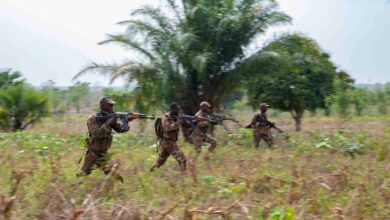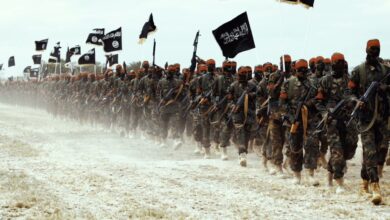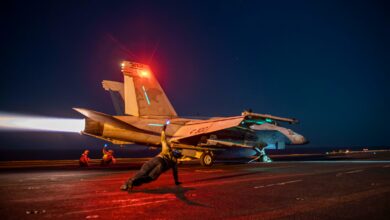Sahelien al-Qaeda affiliate JNIM claimed a deadly attack in Mali near the border with Burkina Faso targeted forces from the G5 Sahel, days before an ECOWAS summit that will discuss counter-terrorism in the Sahel and the Lake Chad region.
In a Thursday, September 12 statement in Arabic, the Support Group for Islam and Muslims (JNIM) claimed its fighters “carried out an ambush against a group from the G5 forces who have invaded Mali’s land.”
Nord Sud Journal reported local sources as saying that at least two Malian soldiers were killed in a September 11 ambush in Dioungani in the Cercle of Koro, which is around 150 km (93 miles) east of Mopti and less than 20 km from the Burkina border.
JNIM said the attack was in the area of “Jougani” near what it described as the “artificial border” between Mali and Burkina Faso.
It claimed six gendarmes were killed and a vehicle damaged, and that JNIM fighters “captured light and medium weapons, and ammunition.”
The group’s az-Zallaqa media arm later published two images that it said related to the attack. One image appeared to show two bodies, one of which was wearing military uniform, and a second appeared to show a military pick-up truck and several weapons.

JNIM again warns G5 Sahel against supporting “French occupation”
JNIM formed in March 2017, when several smaller groups including the Sahara branch of al-Qaeda in the Islamic Maghreb, Ansar Dine, Al-Mourabitoun and Katiba Macina merged. JNIM’s leadership under Iyad Ag Ghaly has pledged allegiance to al-Qaeda leader Ayman al-Zawahiri.
The group is active in Mali and has carried out attacks in Niger, but operations in Burkina Faso are increasing. Two soldiers were killed in two simultaneous nighttime attacks on September 12 in Baraboulé and Nassoumbou, around 120 km east of Dioungani in Burkina Faso’s northern Sahel region that borders Mali. Five soldiers were injured, Infowakat reported. Al-Qaeda social media channels attributed the attacks to JNIM.
Update September 17 In a statement released by its az-Zallaqa propaganda outlet, JNIM said its fighters were responsible for the Baraboulé and Nassoumbou attacks, claiming that four soldiers were captured and the barracks blown up, adding that the simultaneous attacks were a message to ECOWAS states ahead of their meeting.
Al-Qaeda-linked militants have also begun to assassinate people seen as collaborating with French forces, according to France 24’s Wassim Nasr.
In a September 5 statement, JNIM reinforced its opposition to France, warning the governments of the G5 Sahel group of states that attacks against their forces would continue while they support the France-led Operation Barkhane counter-terrorism force.
“It is high time for the governments of the Sahel called the “G5″ to re-consider their involvement with the occupier,” JNIM said.
The 4,500-strong Barkhane force has mandate for counter-terrorism operations across the Sahel and includes personnel from Estonia and helicopters from the United Kingdom. Denmark plans send two helicopters and up to 70 troops to support the force.
Barkhane focuses activity in insurgent-hit Mali, Burkina Faso, and Niger, and troops work alongside other international operations, including MINUSMA, the United Nations stabilization mission in Mali, and the G5 Sahel Joint Force, the long-planned 4,500-strong joint counter-terrorism force comprising troops from Burkina Faso, Chad, Mali, Niger and Mauritania.
France spearheaded the G5 Sahel initiative, but it has been undermined by lack of training, poor equipment and a shortage of funds. United Nations Secretary-General Antonio Gutteres has long-called for regular U.N. funding for the G5 Sahel Joint Force, but the U.S. has pushed back against direct funding, preferring instead bilateral funding for individual states.

ECOSWAS counter-terrorism summit
Saturday’s Extraordinary Summit on Counter-Terrorism for heads of state of the Economic Community of West African States (ECOWAS) will focus on the Sahel and the Lake Chad Basin and seeks to build on earlier discussions in Niger between stakeholders on terrorism and inter-communal clashes in the region.
A counter-terrorism action plan on developed from those meetings was due to be presented to the ECOWAS Council of Ministers on Thursday, ahead of the September 14 summit.
Proposals include the “deployment of the ECOWAS Standby Force to contribute to the fight against terrorism.”
ECOWAS is comprised of 15 countries whose economies range from regional heavyweights Nigeria and Côte d’Ivoire to the impoverished Liberia and Sierra Leone. Burkina Faso, Mali and Niger are non-coastal states.
Most of the ECOWAS leaders are expected to attend the special one-day meeting – which will also be attended by Chad, Cameroon and Mauritania – and the G5 Sahel is expected to top the agenda.
There is growing concern that violence in the Sahel could spread south and west, affecting coastal countries in west Africa.
“It started in Mali, it went to Burkina Faso, Niger and now, when we speak with the presidents of Ghana, Benin, Togo, and Ivory Coast, they say that terrorism is coming to their borders,” Guterres said last week at a regional counter-terrorism conference in Kenya’s capital Nairobi.
“I totally believe we are not winning the war against terrorism in the Sahel and that the operation should be strengthened,” he added.
Guterres said it is essential African forces had “the adequate mandate and the adequate financing” and called for joint efforts to fight extremism beyond the Sahel.
The presidents of West Africa “believe that we need a much more robust and collective response, that the international community needs to find the mechanisms to fully support it,” Guterres said.

Calls for international coalition to counter Sahel insurgency
Another significant threat to the region comes from Islamic State West Africa Province in Nigeria, Niger, Chad and Cameroon. Since May, Islamic State has attributed insurgent activities in the Mali-Burkina Faso-Niger tri-border area to its West Africa Province affiliate, rather than to what was previously known as Islamic State in the Greater Sahara.
Some ECOWAS members have also called for an international coalition to battle the insurgency in west Africa.
Niger’s President Mahamadou Issoufou at an African Union summit in July called for the creation of an “international coalition” modeled on the alliance that fought ISIS in Iraq and Syria.
Previously in May, Burkina Faso called for an international coalition to tackle terrorism in the Sahel.
The idea of a wider international pitch also appeals to Côte d’Ivoire, which in 2016 suffered a terror attack that claimed 19 lives.
Its northern border has been declared by France’s foreign ministry to be an “orange” security risk – French nationals are advised not to go there unless necessary.
“MINUSMA and the G5 Sahel are not enough. We have to find wider and more effective means of coordination,” Ivorian President Alassane Ouattara said.
There may also be trans-Atlantic support for a new initiative – officials said in August that the U.S. will seek additional contributions from the Global Coalition Against ISIS to combat the group and its affiliates in Africa.

Broader strategy required
French President Emmanuel Macron, who has lobbied relentlessly for donations for the G5 Sahel force, has also signaled a subtle shift in tone, saying in August that it was time “for change, in methods and scale.”
A French security official, speaking on condition of anonymity, reacted guardedly to the potential outcome of the Ouagadougou summit.
“Another summit, another meeting, another meeting which ends in a call for more cooperation … Perhaps. But at least you can see a movement for change.”
Beyond the military realm, there is a widening acknowledgement among analysts, politicians and army officers themselves that security is only one part of a much broader strategy to stabilize the Sahel.
“There are many advantages in seeing the coastal countries taking over the problem. Their economies are wealthier and they have a better chance of luring international donors” for security and development, Mahamadou Savadogo, an academic at the CERRAD research unit into democracy and development at Senegal’s Gaston Berger University said.
But others have cautioned against developing or deploying another counter-terrorism force in West Africa.
ECOWAS should use its experience ind regional stature to “push the advantages of existing stabilisation initiatives by proposing a constructive and efficient coordination mechanism among them,” Lori-Anne Théroux-Bénoni, Regional Director in the Institute for Security Studies Office for West Africa, the Sahel and the Lake Chad Basin wrote earlier this week.
“Enhancing collaboration within existing structures, providing special status to interested states who could provide extra capacity, and advocating for more attention to non-military/security initiatives might help improve security,” Théroux-Bénoni added.
With reporting from AFP












